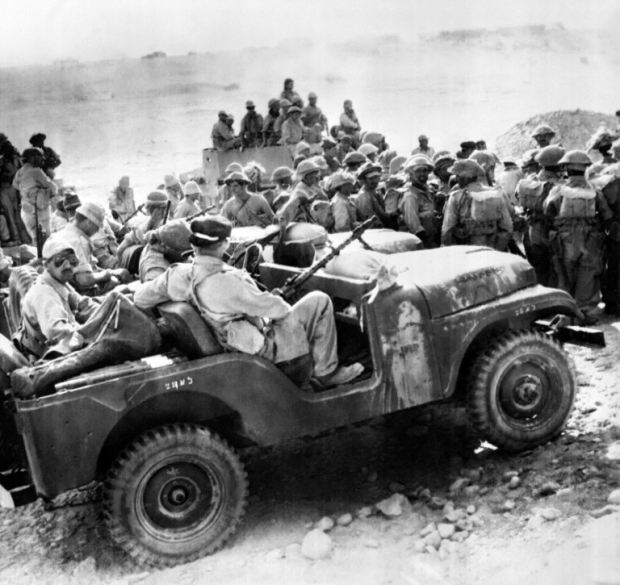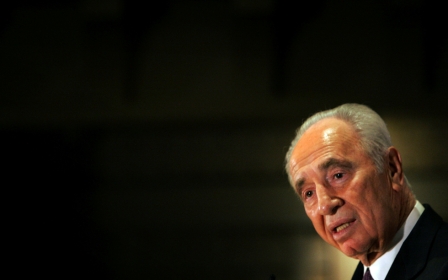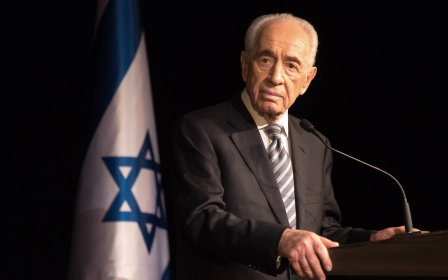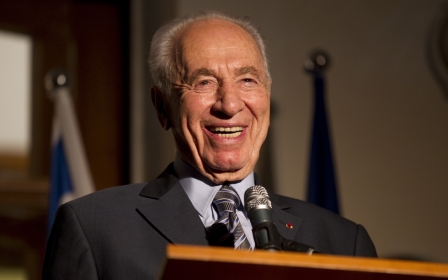Man of war, man of peace: The split persona of Shimon Peres
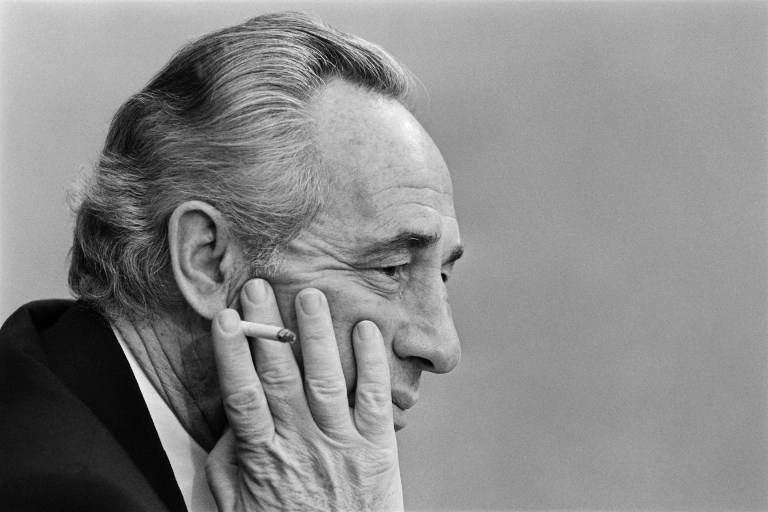
Dozens of leaders from around the world, from the American president Barak Obama right down to the Togolese president Faure Gnassingbé, are supposed to attend the funeral on Friday of Shimon Peres, Israel's ninth president and a Nobel Peace Prize laureate. Flags all over the US will be lowered during the funeral of this "man of peace", as he is described almost all over the world.
Yet there will be at least one big absence from the funeral. Most representiatives of the Palestinians, the people this "man of peace" supposedly did peace with, will probably not attend the ceremony, although President Mahmoud Abbas, Peres' main partner for the Oslo agreement in 1993, has sent a request to attend.
In the popular Maan News Agency, Peres was summarily described as "a man of war, nuclear weapons and settlements".
There are some good reasons for this huge gap between how Peres was viewed in Israel and in most of the Western world on the one hand and how he was regarded in Palestine and in most of the Arab world on the other.
Suez architect, settlement godfather
Even before the signing of the agreements with France on selling a nuclear reactor to Israel in 1957, Peres – then the general manager of Israel's defence ministry - was one of the main architects of a now somehow forgotten Suez war of 1956.
The war itself, a joint operation with Britain and France aimed at taking over the Suez Canal and toppling Egyptian president Gamal Abdel Nasser, did not give Israel any material gains. Yet it almost irrevocably identified Israel with the colonial forces in the Middle East. The notion of Israel being a "Western bastion" in the region was forged then.
Peres also had an instrumental part in spreading the Israeli settlements all over the West Bank. In 1975, while serving as defence minister under prime minister Yitzhak Rabin, he conspired with leaders of the then-nascent settler movement to allow them to a built a first settlement in the heart of the West Bank.
"I am not aware of any principle preventing settlement in Judea and Samaria," Peres told the Israeli parliament after he reached an agreement with the settlers, allegedly behind Rabin's back. "It is not a dispute about vision, it is a dispute about timing." Although he may have regretted it later, Peres had a large stake in making this "vision" into the settlement reality we see now in the West Bank.
After Rabin's assassination in 1995 and his nomination as prime minister, Peres had a unique chance to push for peace. He missed it. In order to bolster his image as a man of war in view of the 1996 elections, Peres ordered a military operation in Lebanon which ended in the shelling of a UN compound in Qana village, where hundreds of Lebanese civilians found shelter. One hundred and six of them were killed in the attack.
Not less importantly, Peres ordered the assassination of Yahya Ayyash, the leader of the military wing of Hamas. Ayyash was indeed responsible for attacks on Israeli civilians, but his assassination - one of the first of what later became to be known as "targeted killing" - led to a renewed wave of attacks in major Israeli cities in which 60 Israelis were killed.
These attacks played a major part in Benjamin Netanyahu's victory in the election held a few months later. Instead of moving forward, the peace process with the Palestinians came to a halt.
Process, not peace
Yet the main reason behind the Palestinian and Arab indifference and even rejoicing at Peres' death - compared with the compassion manifested after the assassination of Rabin, a proved man of war with the Palestinians - may lie elsewhere. In the last 15 years, as a minister in Ariel Sharon's and Ehud Olmert's governments and later as president, Peres was busy mainly presenting a peace-loving image to Israel's continued occupation policy.
Without giving up land, removing settlements or establishing an independent Palestinian state, the Oslo agreement gave international credence to the claim that Israel seeks peace with the Palestinians. This worldwide legitimisation helped it to build economic and political ties undreamt of before.
Israel found out that an ongoing "peace process" is better than peace itself, in which there are high prices to be paid. Netanyahu could not have declared his commitment to the two-state solution while continuing the settlement project, without understanding this very basic truth. With his international fame, Peres was the embodiment of this approach. He represented the Israel which the Western world liked to see. The high-profile participation in his funeral is a proof as to how successful he was in his efforts.
Yet there is another side to Peres's legacy. His fading away from actual politics ever since his election as president in 2007 and even before, coincides with the fading away of the peace discourse from Israeli politics. For better or for worse, Peres' political raison d'etre was his insistence on the need for peace with the Palestinians.
Peace camp in shambles
As long as Peres stood at the centre of Israeli politics, the main public debate was whether Israel should renounce its domination over the Palestinians and under what conditions. This question was a source of heated debate, and Peres' support for a negotiated peace deal with the Palestinians earned him the scorn and even hatred of many in Israeli society.
Peres' death is just another symbolic landmark in the decaying peace discourse in Israel
Today this kind of debate has virtually disappeared from the Israeli political map. In the last two electoral campaigns, the main contenders argued about practically all issues, except the Palestinian one. Peres, already a president with no real political influence, preferred to be embraced by public opinion than to challenge this approach.
This process has its origins in the failure of the Camp David summit between Ehud Barak and Yasser Arafat in May 2000 and the breaking out of the Second Intifada a few months later. Peres himself contributed to this change when he joined Sharon's Kadima party in 2006, right after Sharon unilaterally withdrew from Gaza, thus marking his disbelief in a negotiated peace deal with the Palestinians.
Except for the tiny Meretz party and the mainly Arab Joint List, there is no prominent Israeli leader who chooses the peace process as his political flag. Tzipi Livni, ex-foreign minister, tried to raise this flag, but to no avail. She remains a marginal political figure. Peres's death is just another nail in the coffin of the decaying peace discourse in Israel.
Some cynical commentators have claimed that Peres's funeral will also mark the burial of the two-state solution of which he was such an important bearer. This may be a little exaggerated. But it is true that with Peres's absence, what remains of the Israeli peace camp will have to reinvent itself if it wants to be relevant again. It is doubtful if Peres's legacy will help this peace camp to rebuilt itself.
- Meron Rapoport is an Israeli journalist and writer, winner of the Napoli International Prize for Journalism for an inquiry about the stealing of olive trees from their Palestinian owners. He is ex-head of the News Department in Haaertz, and now an independent journalist.
The views expressed in this article belong to the author and do not necessarily reflect the editorial policy of Middle East Eye.
Photo: An archive portrait taken on 22 January 1981 in Paris shows then-Israeli Labor Party leader Shimon Peres (AFP)
This article is available in French on Middle East Eye French edition.
New MEE newsletter: Jerusalem Dispatch
Sign up to get the latest insights and analysis on Israel-Palestine, alongside Turkey Unpacked and other MEE newsletters
Middle East Eye delivers independent and unrivalled coverage and analysis of the Middle East, North Africa and beyond. To learn more about republishing this content and the associated fees, please fill out this form. More about MEE can be found here.



